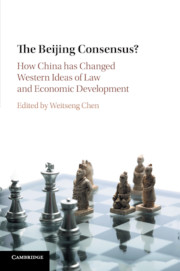Book contents
- Frontmatter
- Contents
- Figures
- Contributors
- Acknowledgments
- Introduction: Debating the Consensuses
- PART I Deconstructing the Beijing Consensus
- PART II Examining the Beijing Consensus in Context
- PART III Revisiting the Beijing Consensus
- 9 Authoritarian Justice in China: Is There a “Chinese Model”?
- 10 China's Striking Anticorruption Adventure: A Political Journey Toward the Rule of Law?
- 11 Chinese Corporate Capitalism in Comparative Context
- Bibliography
- Index
10 - China's Striking Anticorruption Adventure: A Political Journey Toward the Rule of Law?
from PART III - Revisiting the Beijing Consensus
Published online by Cambridge University Press: 28 April 2017
- Frontmatter
- Contents
- Figures
- Contributors
- Acknowledgments
- Introduction: Debating the Consensuses
- PART I Deconstructing the Beijing Consensus
- PART II Examining the Beijing Consensus in Context
- PART III Revisiting the Beijing Consensus
- 9 Authoritarian Justice in China: Is There a “Chinese Model”?
- 10 China's Striking Anticorruption Adventure: A Political Journey Toward the Rule of Law?
- 11 Chinese Corporate Capitalism in Comparative Context
- Bibliography
- Index
Summary
China is a high-corruption country and the ruling Communist Party (“the Party”) has made anticorruption enforcement a top priority. China is also well known for her authoritarian decisiveness in policy making and her effectiveness in policy implementation with a centralized political control contrasting sharply with a decentralized economic policy. This chapter examines two key aspects of this formulation. First, how has the authoritarian characteristic affected China's anticorruption enforcement; and, second, how is China different from other countries, authoritarian or otherwise, in this regard?
There has been an ongoing debate between a “convergence theory” and a “divergence theory” on China's political-legal development. According to the convergence story, nations differ in their level of legal development largely because of the different levels of economic growth. China is significantly different from high-income countries because China, as a middle-income country, lacks resources and capacity to support an advanced system. But as China progresses economically, social and legal changes are bound to follow. Consequently, gaps in the legal system will be filled, and the distance between a mature legal system and an emerging legal system will be narrowed. Substantive convergence is the destination of all legal systems even though it may appear in different forms. There is an incremental trajectory along which nations develop their legal system, in a thin sense, and, while sequencing in a certain sense may be important, all nations can achieve that trajectory once the necessary conditions are present. In the anticorruption field, the Party proves to be resolute and innovative in designing anticorruption strategies and has demonstrated both the will and ability to put corruption under effective control by resorting to measures that are not fundamentally different from international best practices.
While the divergence theory has a long spectrum of arguments, its central argument is that China has a unique system that renders convergence impossible. In Minxin Pei's cynical formulation of a “trap thesis,” China's political model suffers from fatal flaws and is not self-correcting. Following a liberal line of conceptualization, Pei argues that, without meaningful political competition, separation of powers, independent legal institutions and active participation from the civil society, China is unlikely to overcome its corruption problem that is inherent in the authoritarian system. As a result, the regime becomes increasingly fragile structurally as it sinks deeper into a trap.
- Type
- Chapter
- Information
- The Beijing Consensus?How China Has Changed Western Ideas of Law and Economic Development, pp. 249 - 274Publisher: Cambridge University PressPrint publication year: 2017
- 3
- Cited by

